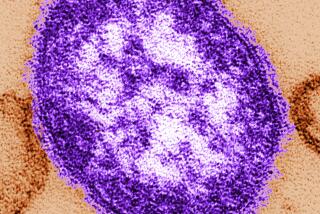California can’t afford to cater to the anti-vaccination crowd
- Share via
The state of California issued an advisory on measles last week. Though only about a dozen cases have been reported so far, many more people have been exposed to the virus. In the Bay Area, thousands were warned to watch for signs of the disease after a man who’d been infected on a trip to Asia rode a BART train. In Los Angeles, far more people than necessary were exposed to measles because doctors failed to report two patients’ cases immediately. One had traveled to Asia; the other had been exposed to a recently infected traveler.
All three were unvaccinated.
Authorities haven’t said why these people were never inoculated, but there’s no question that the anti-vaccination movement is contributing to new outbreaks of preventable diseases by disseminating unfounded scare stories based on discredited research. Increases in measles and whooping cough offer evidence that failure to vaccinate is a public health concern that calls for tighter vaccination laws in California and elsewhere.
These outbreaks would be of less concern if they only affected unvaccinated people who had made the decision to take the risk. But that’s not the case. Vaccination doesn’t immunize every person who gets the shots; some of the recent California cases were among people who had been vaccinated. What’s more, some people have medical conditions that preclude being vaccinated. And some babies too young for the vaccine have died after contracting whooping cough. These three groups can be protected only by what doctors call “herd immunity.” Widespread vaccination keeps the disease out of the population, protecting everyone in it, including those without immunity.
A new law that took effect this year is aimed at reducing the number of parents who opt out of vaccinating their public school children. But Gov. Jerry Brown shot a big hole in it. The original legislation required parents who didn’t want to vaccinate their children to obtain the signature of a healthcare professional, showing that they had been informed about the benefits and risks of vaccination. A similar law in Washington state cut the refusal rate by half.
Brown signed the legislation, but then ordered regulators to create a religious exemption. Under the weakened rules, parents who claim that their religious beliefs don’t allow them to vaccinate their children can simply sign the form. It’s far too easy.
From our perspective, even the original legislation was weak. All schoolchildren, and all students in our state colleges and universities, should be vaccinated for highly contagious illnesses, except for those who need to be exempted for medical reasons. Mississippi and West Virginia do not allow religious exemptions, and California shouldn’t either. Religious beliefs must be protected, but they shouldn’t be allowed to erode public health.
More to Read
Sign up for Essential California
The most important California stories and recommendations in your inbox every morning.
You may occasionally receive promotional content from the Los Angeles Times.










